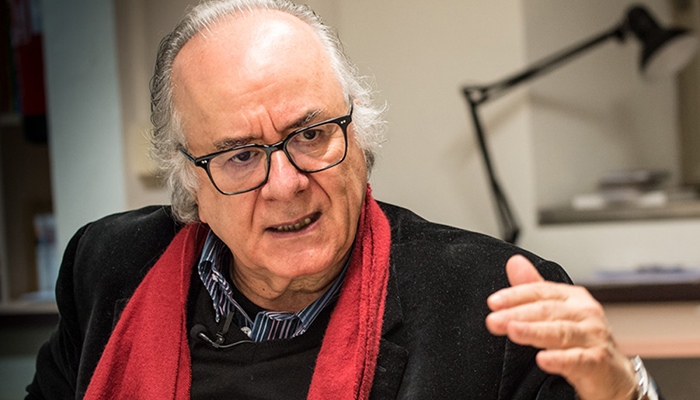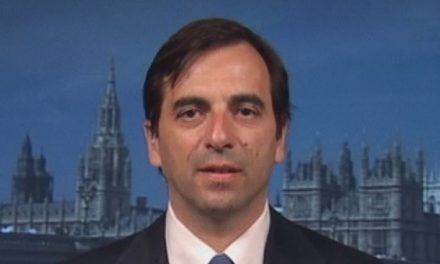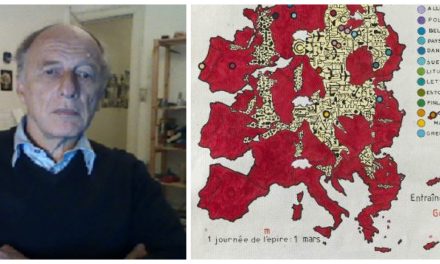Boaventura de Sousa Santos is Professor of Sociology, University of Coimbra (Portugal), and Distinguished Legal Scholar at the University of Wisconsin-Madison. He is director of the Center for Social Studies at the University of Coimbra and has written and published widely on the issues of globalization, sociology of law and the state, epistemology, social movements and the World Social Forum. His most recent project is ALICE: Leading Europe to a New Way of Sharing the World Experiences.
Professor de Sousa Santos spoke to “Epohi” weekly newspaper (Dimitris Givissis: Interview with Boaventura de Sousa Santos, 21.1.2018):
Europe is in a big and multifaceted crisis. Do you think it is a temporary crisis, or do you think it will get permanent and irreversible features?
Europe is not an island. The anomic and dystopic vocation of the global neoliberal disorder is reaching new thresholds as the concentration of wealth and the environmental crisis reaches unprecedented levels. The fall of the petrodollar seems closer and closer as China and Russia buy gold and prepare to negotiate oil and gas contracts in yuan. Saddam Hussein and Kaddafi payed a dear price for their attempts and Venezuela may follow the same destiny, while Brazil, another of the BRICS, is neutralized by the judicial-political coup instigated by US imperialism. For the same reason, Yemen must be destroyed and, in line with his predecessors, President Donald Trump prepares “his” war, this time against Iran.
Particularly after Durão Barroso became president of the European Commission (2004-2014), the EU turned into a subaltern partner of neoliberal globalization. At first, only foreign countries, non-European countries in Africa and Latin American, noticed the changes as they realized how the Brussels technocrats aligned themselves almost unconditionally with US based multinationals, World Bank and IMF officers in negotiations of trade agreements. As the financial crisis of 2008 hit Europe in 2011 (Greeks have a tragic experience of it), it became finally clear to most of European citizens that neoliberal orthodoxy had hijacked the European project (probably an illusion from the start) of combining development with social protection in a wider politically democratic community. Raw economic and hence political power was in charge, the vulnerable countries were made more vulnerable so that the political costs of intervention would diminished. As I said, non-European countries knew all this by tragic experience. For Europeans it was a surprise since most them had forgotten not only about the remote past but also about thr recent one, the World War II.
In light of this, the European Union is tied up to the fate of neoliberalism; in this respect the crisis may be considered as permanent as the crisis of neoliberalism. The political disintegration began with the way the so-called “Greek crisis” was dealt with, continued with Brexit and the rise of the extreme-right under the guise of a new version of populism (always a rightist political reaction, never a leftist one).
The rhythm of the crisis may change and, in my view, it is changing, but the fundamental tendency will continue unless a deeper political transformation takes place. As I write, the rhythm of the crisis seems to be slowing down with the designation of the former Portuguese Finance minister, Mario Centeno, as finance minister of the Eurogroup. As I will argue below, the recent Portuguese political experience has shown that the neoliberal orthodoxy is a lie, a tragic lie, and Mario Centeno was an important protagonist in demonstrating this. Probably out of a survival instinct, the dominant powers in the EU (Germany and France) and the technocrats of the European Commission have concluded that insisting on the neoliberal impositions would lead, rather sooner than later, to the end of the benefits they collected from an unequal integration and for the Brussels establishment, the end of their golden jobs and privileges. They first reacted by showing to the UK that it would pay a very high price for leaving the EU unilaterally; and then chose Mario Centeno as a signal that they were ready for some kind of reformist change. How successful this move may be remains to be seen. Above all, it remains to be seen if Centeno will have, at the European level, the political support he had at the national level to conduct the very moderate but highly successful anti-neoliberal policies. Quite frankly, I doubt it, but, as I always insist, sociologists are good at predicting the past not the future. In any case the reasons for some pessimism are grounded both in the recent declarations of Jens Weidmann, the president of Bundesbank and in the new, socially insensitive European budget for 2018 indeed approved by the European Parlament with unprecedented lack of consensus.
You have talked about the need of building a new vision for Europe. How can this happen? And what will be its features?
Europe faces an intricate challenge: to reinvent itself both from its centre and its margins. Such reinvention will not take place unless a double transformation occurs: a transformation in the ways we know what is happening to us and to the world and in the ways we educate the European youth according to such knowledge (epistemological shift); and a transformation in the political configuration of Europe as a supranational entity and as an international actor (political shift).
Throughout the last one hundred years, Europe became a continent of high expectations and dismally broken promises: the promise of social justice and human rights; the promise of anti-colonialism; the promise of democracy and the end of authoritarian political regimes; the promise of cultural diversity and peaceful conviviality. The expectations were as high as the frustrations were deep in light of a resilient dissonance in real politik. The continuing oscillation between these two poles led to a political culture run by exorbitant hopes and nihilistic fears. Until the Fall of the Berlin Wall, Europe (what was then Western Europe) was run by the predominance of hope over fear; since then we have entered a period of the predominance of fear over hope. At first, the fear was about the survival of social democracy (democracy with social and economic rights), today it is more and more about the survival of democracy tout court (democracy reduced to civil and political rights).
The new vision of Europe is based on the realistic utopia that it is possible to move to a period of probably less brilliant hopes but hopes that are resilient enough to keep the nihilistic fears at bay. The epistemological shift is premised upon the need to learn from the Global South (both extra-European and intra-European South) which has a long historical experience of living collectively with more humble hopes and with a sustained capacity to resist against fear-inducing oppression caused originally by European colonialism. Since the seventeenth century colonialism has been the core identity of Europe together with capitalism and patriarchy. We should bear in mind that external colonialism was first tried out inside Europe, as internal colonialism, as Ireland, Spain and several countries in Eastern Europe illustrate. The way the recent financial crisis in South European countries has been dealt with by core Europe shows how active and vicious such internal colonialism remains today.
Looking to the world with less arrogance and with the will to learn instead of teaching, involves a cognitive and educational paradigmatic change. This epistemological shift will occur side by side with a political shift. Europe has a future as transnational entity to the extent that it engages in an active anti-colonialist politics, both in relations with the non European world and in the intra-European relations. A new attitude regarding the infinite diversity of the world and of Europe itself. The outside world is expanding and Europe is shrinking. The continuation of the colonial attitude is suicidal. During the Cold War and because it was internally divided, Europe stayed outside the main rivalries among the super powers. This relative distance was the precondition for the relative international autonomy of Europe. After the end of the Cold War Europe surrendered too easily to US global hegemony and became a subaltern partner in an imperialist drive for unilateral power, economically driven by neoliberalism. Such power is declining and the neoliberal disorder is becoming more and more evident. The USA can afford to put America first by threatening wars against any imagined competitor (the real ones are only China and Russia to a certain extent). In Europe such strategy is suicidal given the structural weakness of Europe concerning the most crucial resources to conduct such wars (both military and financial resources). The new vision of Europe demands that Europe distances itself from USA. Only in this way can Europe pursue a credible anti-colonial politics in relation to the world. The problem is that under current conditions of neoliberal globalization anti-colonialism is not possible disengaged from anti-capitalist politics. This is only possible with a significant deepening of democracy beyond the liberal mold. At a time in which the serious ecological crisis is indicating to us the end of the Cartesian view of nature as an infinitely available natural resource, we must sponsor humble hopes of dignity and conviviality. But such hopes can only be kept if supported by a utopian horizon. Such horizon, I would venture, is socialism as democracy without end. This utopian horizon will never be fully achieved; but it will keep us walking in its direction.
The recent years, the European social democracy faces its more serious crisis in the after war years. How do you see its future? What do you think will mean the potential participation of SPD in the next German government for the further developments, as it has some special meaning for the European Social democracy?
The SPD represents the most grotesque ruin of European social democracy. At the moment, we experience an interregnum. The world created by neoliberalism in 1989 with the fall of the Berlin Wall ended with the financial crisis of 2008-2011. The world that follows has not been defined yet. The post-1989 world had two agendas with a decisive impact on left politics all over the world. The explicit agenda was the definitive end of socialism as a social, economic, and political system ruled by the State. The implicit agenda amounted to the end of any social, economic and political system led by the State. This implicit agenda was far more important than the explicit one because State socialism was already agonizing and since 1978 thinking of reconstructing itself in China as State capitalism following reforms by Deng Xiaoping. The most direct result of the end of soviet-like socialism was the temporary demobilization of communist parties, some of them already far distanced from the soviet experience. The implicit agenda was the important one, and that is why it had to occur silently and insidiously, without walls falling. In the phase that until then characterized dominant capitalism, the social alternative to soviet-like socialism was universal and social economic rights, of which were beneficiaries mainly those who, devoid of privileges, only had law and rights to defend themselves against the economic and political despotism that was shaping capitalism, by nature prey to the logic of the market. The most advanced form of this alternative was post-war European social democracy, which at the beginning, in early twentieth century, actually comprised an explicit agenda (democratic socialism) and an implicit agenda (capitalism compatible with democracy by means of minimal social inclusion as presupposed by democracy). After 1945, it soon became clear that the implicit agenda was really the only one there was. Ever since the lefts became divided between those that continue to maintain a socialist solution (more or less distant from the soviet model) and those that, no matter how vocal about socialism, only wanted to regulate capitalism and curb its “excesses.” After 1989, as happened at the beginning of the century, the implicit agenda went on being implicit, even though it was the only one in force. It gradually became clear that both previous lefts had been defeated. Hence, the crisis of social democracy. The demobilization of the social democratic left was for a while disguised by the new articulation of forms of domination that were in force in the world since the seventeenth century: capitalism, colonialism (racism, monoculturalism, etc.) and patriarchy (sexism, arbitrary separation between productive and reproductive work, that is to say, between paid and nonpaid work). Social claims aimed at so-called post-material agendas, i.e. cultural or fourth-generation rights. Such claims were genuine and denounced repugnant forms of oppression and discrimination. The way in which they were conducted, however, led the political agents mobilizing them (social movements and ONGs) to think that they could carry them out without touching the third axis of domination, capitalism. What was being designated as class politics was actually neglected in favor of race and gender politics. Such neglect proved to be fatal when the post-1989 regime fell. Capitalist domination, reinforced by the legitimacy earned during those years, readily turned against the anti-racist and anti-sexist conquests, in its ceaseless search for ever more accumulation and exploitation. The said conquests, devoid of anti-capitalist will or separated from anti-capitalist struggles, are finding it increasingly harder to resist. SPD didn’t even manage to be very active in anti-racial and anti-patriarchal politics. As it went on as well losing its call as a class party, particularly under the leadership of Gerhard Schroeder, SPD became one of the most vacuous socialdemocratic parties in Europe, more vacuous even than the British Labour Party.
Can the countries of the European South form a pole that will question the German dominance in Europe? What kind of possibilities are there in your opinion?
The countries of South Europe are peripheral countries in economic terms, with the relative exception of Spain. For some years, there was a credible belief that economic peripherality would be compensated for by political equality within the Union. The crisis of 2011showed that this was a cruel illusion. The Southern countries fought back. Greece first and with little success. Portugal learned a lot with Greece and followed a different path with apparent more success (see below). But up until now they have resisted in isolation. They have a lot to show to the core countries on how to handle crises and go on fighting for social cohesion . In order to be effective, however, they must articulate their European policies. I hope that will be possible in the near future with Spain on board.
To finish with, could you describe us the current situation in Portugal and make an assessment of the Portuguese government so far?
There is no doubt that the left government in power in Portugal since late 2015 is pioneering. It is not very well known internationally not only because Portugal is a small country whose political processes rarely break news in international politics, but also and mainly because it offers a political solution that counters the interests of the two major global enmies of democracy – neoliberalism and global financial capital – which control the media today. Let’s recapitulate. Since the 25 April Revolution the Portuguese have frequently voted in left parties but were ruled by right parties. While the latter would run in coalition, the left parties, following a long historical trajectory, would run as divided by apparently insurmountable differences. This was what happened in October 2015. On this occasion, however, in a gesture of political innovation that will make history in European democracy, the three left parties (Socialist Party, Left Bloc and Communist Party) decided to engage in negociations to find a parliamentary articulation capable of facilitating a left government led by one of these three parties, the one that had gathered more votes, the Socialist Party. Following separate negociations between the Socialist Party and the other two (mutual mistrust was there at the beginning) it was possible to reach governing accords that made possible a left government without precedent in Europe during the last decades. The genius of these accords resided in several premises: 1) the accords were limited and pragmatic, and were focused on minor common denominators in order to facilitate a government capable of stopping the anti-democratic policies implemented in the country by the neoliberal right parties; 2) the parties would zealously keep their programmatic identity – their banner as it were – and made clear that the accords would not put it at risk since their response to the political conjecture would not put it in question, let alone discard it; 3) the government had to be coherent and needed therefore to be the responsibility of one party alone, given that parliamentary support would guaranty its stability; 4) good faith would preside over the accords and the latter would be regularly checked by the parties involved. The accord documents are models of political contention and rigorously detail the agreed upon terms. Basically, the agreed upon measures had two major political objectives: put an end to the impoverishment of the Portuguese by retrieving the income of workers and retirees according to the income scale, and stop the privatizations which, under neoliberalism and finance capital, are nothing less than acts of piracy. The accords were successfully negotiated; the government took office in a politically hostile climate generated by the then President of the Republic, the European Comission and the financial agencies – all of them servile lackeys of neoliberal orthodoxy. Gradually, the government policies yielded surprising results. Soon enough, many detractors had to acknowledge economy growth, unemployment decrease, and overall improvement of the country’s image. The meaning of all this can be summed up as follows: by putting in place policies that are opposed to the neoliberal recipes, the very results advertised by the latter are achieved without augmenting the impoverishment and suffering of the Portuguese. On the contrary, achieving moderate betterment. More clearly, this political innovation shows that neoliberalism is a lie and that its only purpose it to further the concentration of wealth under global financial capital.
Of course, the national and international neoliberal right is not happy at all and will try to put an end to this political solution with the help of that fraction of the right that never liked the excesses of neoliberalism and wants to grab power again.
N.N.















